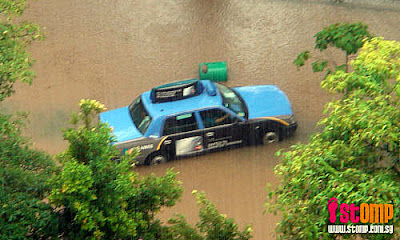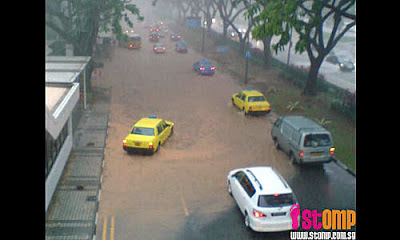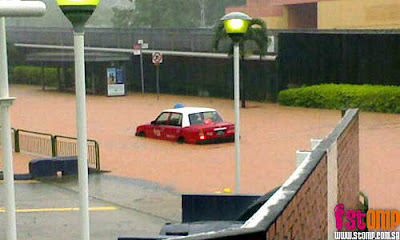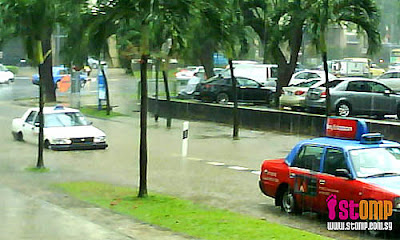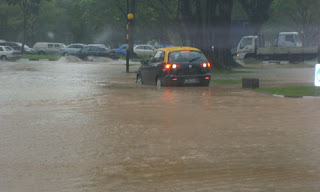Friday 30 November 2007
六工会建议调高德士车资
● 李静仪
六大德士公司:康福、城市、SMRT、胜达(SMART)、Premier和得运(Trans-cab)的德士师傅协会,分别向公司建议调高德士车资,以舒缓燃油成本上涨所带来的营业压力。
这包括提高目前2元5角的德士起程车资以及按车程距离计算的车资。
德士师傅协会表示,德士的整体车资应反映司机的营业成本,随着柴油价格不断飙升,协会因此促请所有德士公司调高收费。
协会大概是在两个月前,当柴油零售价节节攀升时首次向公司提出起价的要求,之后双方展开了多次对话。据知,公司管理层正详细研究有关建议,还未给予答复。
城市德士师傅协会会长黄建忠指出,几年前柴油每公升才卖7角,现在已超过1元5角,整整上涨了一倍有余。
他受访时说:“柴油价格涨得这么厉害,加上车租和消费税,司机所要承担的成本越来越重,扣除这些开销,一般司机的收入比麦当劳快餐店服务员还要低。”
德士师傅协会并没有提出车资调整的具体幅度。它也向公司建议,征收“定点附加费”(location surcharge),协助解决繁忙时段某些地方德士供不应求的问题。
黄建忠说:“其实我们也左右为难,如果起程车资只是起价一两角,无法抵消额外的柴油开销,但如果起得太高,又担心会影响乘客对德士的需求,真是调高也死,不调也死。”
他指出:“本地的德士车资其实比起其他城市便宜许多,贵的是公路电子收费(ERP),但很多乘客不明白,ERP并不是装入司机口袋,而是政府要征收的。”
德士起程车资上一次调高是在去年7月,当时是从2元4角上调一角,这也是过去12年来起程车资首次调高,在1994年之前定为2元2角,更早以前是1元9角起。本地德士起程车资
比其他先进城市低
受访的学者认为,本地德士起程车资和其他先进城市相比确实过低。
政府国会交通委员会主席符致镜指出:“从全国交通规划的角度来看,如果起程车资这么低,如何鼓励更多人改搭巴士和地铁?”
他认为,德士应清楚被视为是个人化的优质服务,配合政府要推广公共交通工具的大目标,就应确保巴士和地铁车资保持低廉,个人化的交通费则要高。
国大交通运输研究中心研究员李德纮博士认为,德士车资结构需进行结构性的改变,政府有必要采取措施来管理这个市场。
他说:“当初政府解除管制时,目的是要促进竞争,但在康福和城市德士合并后,这已不是个完全竞争的市场,如果政府没有介入,现在的市场可能没办法达到政府之前解除管制的用意。”
根据国大在2005年进行的研究显示,在亚洲10个城市中,本地德士车资在“昂贵排行榜”名列第六,东京居首,雅加达殿后。
国大经济系的甄定兴副教授则从另一个角度探讨繁忙时段德士供不应求的问题。
他指出,一些德士运作上的问题,例如不能在市区路边载客,或德士站的设计无法同时让更多德士排队等客,或许是政策制定者需探讨的情况,不是所有问题都和钱有关,或许当局制定的一些条例也是造成德士短缺的原因。
德士市场老大康福德高受询时不愿针对调高车资的建议做出回应。但根据以往的情况,只要康福德高有所行动,其他规模较小的业者预料也会跟进。
刚于两个多月前开业的百胜德士则另有打算。曾公开提倡调高起程车资的百胜老板梁南兴告诉本报,即使“老大”明天决定起价,百胜三至六个月内暂不会调整车资,以吸引更多人搭乘。
Thursday 29 November 2007
What drives the bad cabbies?
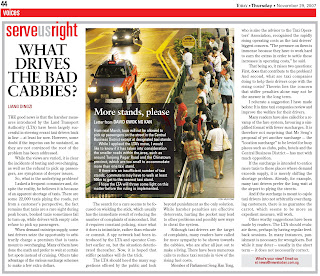
Thursday / November 29, 2007
Liang Dingzi
THE good news is that the harsher measures introduced by the Land Transport Authority (LTA) have been largely successful in steering errant taxi drivers back in line - at least for now. However, some doubt if the impetus can be sustained, as they are not convinced the root of the problem has been addressed.
While the views are varied, it is clear the incidents of touting and over-charging, as well as the refusal to pick up passengers, are symptoms of deeper issues.
So, what is the underlying problem?
I asked a frequent commuter and, despite the reality, he believes it is because of an apparent shortage of taxis. There are some 22,000 taxis plying the roads, yet from a customer's perspective, the fact remains that taxis are a rare sight during peak hours, booked taxis sometimes fail to turn up, while drivers with empty cabs refuse to pick up passengers.
When demand outstrips supply, some taxi drivers seize the opportunity to arbitrarily charge a premium that is tantamount to overcharging. Many of them have done the math and prefer to wait at certain hot spots instead of cruising. Others take advantage of the various surcharge schemes to make a few extra dollars.
The search for a cure seems to be focused on wielding the stick, which usually has the immediate result of reducing the number of complaints of misconduct. But it requires constant policing, since what it does is intimidate, rather than educate or commit. A spy network had been introduced by the LTA and operator Comfort earlier on, but the situation deteriorated thereafter. Now, it is hoped that stiffer penalties will do the trick.
The LTA should heed the many suggestions offered by the public and look beyond punishment as the only solution. While harsher penalties are effective deterrents, hurting the pocket may lead to other problems and possibly new ways to cheat the system.
Although taxi drivers are the target of complaints, many readers have called for more sympathy to be shown towards the cabbies, who are after all just out to make a living. There have been numerous calls to reduce taxi rentals in view of the rising fuel costs.
Member of Parliament Seng Han Tong, who is also the advisor to the Taxi Operators' Association, recognised the rapidly rising operating costs as the taxi drivers' biggest concern.
"The pressure on them is immense because they have to work hard to earn the extras in order to settle these increases in operating costs," he said.
That being so, it raises two questions: First, does that contribute to the problem? And second, what are taxi companies doing to help their drivers cope with the rising costs? Therein lies the concern that stiffer penalties alone may not be the answer in the long term.
I reiterate a suggestion I have made before: It is time taxi companies review and improve the welfare for their drivers.
Many readers have also called for a revamp of the fare system, favouring a simplified format with fewer surcharges. It is therefore not surprising that Mr Seng's proposal of yet another surcharge - the "location surcharge" to be levied for busy places such as clubs, pubs, hotels and the Central Business District ?has met with much opposition.
If the surcharge is intended to entice more taxis to these places where demand exceeds supply, it is merely shifting the shortage problem. Already, for example, many taxi drivers prefer the long wait at the airport to plying the streets.
And if the surcharge is meant to cajole taxi drivers into not arbitrarily overcharging customers, there is no guarantee the carrot, which seems to be more an expedient measure, will work.
Other worthy suggestions have been made by readers. The LTA should evaluate them, perhaps by having regular feedback sessions. In many instances, punishment is necessary for wrongdoers. But while it may deter - usually in the short term - it does not necessarily correct.
Copyright MediaCorp Press Ltd. All rights reserved.
鲁莽驾驶并撞了就跑 德士司机坐牢驾照吊销8年
一名德士司机鲁莽驾驶,撞倒电单车后逃离现场,但他的车牌被目击者抄下,结果被警方逮捕。
这起车祸于今年4月20日下午4时49分左右,发生在武吉巴督东6道和2道交界处。事发后,电单车骑士惹玛努汀(24岁)被抛到马路上,身受重伤,送入医院后不治。
肇祸司机何福良(69岁、译音)昨天认罪,法官判他坐牢7个月、罚款1000元及吊销各级驾照8年。
事发当天,被告何福良驾驶德士在武吉巴督东6道的路段行驶,来到武吉巴督东6道和2道一个受交通灯管制的交界处准备右转,突然间,德士转向中间车道,这个车道只能直走,不能转右,但被告却使用车道转右,结果德士驶入一辆电单车的车道。
电单车骑士是惹玛努汀,他马上煞车,但已经来不及,电单车和德士相撞。惹玛努汀被抛离电单车,跌到马路上,昏迷不醒。他身受重伤,过后被送入国大医院,当天傍晚6时伤重去世。
事发后,被告并没有停车,逃离现场。一名公众刚好开车经过,目睹这一幕,开车追赶,并抄下德士的车牌,过后把资料提供给警方。
被告面对四项控状,包括鲁莽驾驶、车祸后没有停车、没有伸出援手及擅自移动车辆,意图销毁证据。律师求情时指出,被告当天早上约7时开工,驾驶德士在马路上行驶了一段时间。被告并没有超速驾驶,他是因为判断错误,导致车祸发生。
他说,被告年迈,健康欠佳,当德士司机23年。自从发生车祸,被告患上抑郁症,曾在心理卫生学院接受治疗。
律师指这起案件与其他撞了就跑车祸不同,虽然车祸发生后被告没有停车,但他后来还是折返现场。被告从望后镜看见电单车倒在马路上,便U转回到车祸现场。当时,电单车骑士倒在马路上,有人在旁边照顾他。
不过,法官不接受律师的说法。法官说,这起案件与其他撞了就跑车祸并没有什么不同,被告鲁莽驾驶,导致车祸发生,过后又不停车,法庭必须依法惩治。
SUDDEN DEATH 2 - No one took notice when they saw cabby reclining in taxi with 'On Call' sign on
Bus driver says "I was afraid to wake him up.
SIX times, he spotted the stationary red taxi from Trans-Cab as he drove back to his HDB block.
By Celine Lim
08 December 2006
SIX times, he spotted the stationary red taxi from Trans-Cab as he drove back to his HDB block.
But schoolbus driver Teh Puay Khoon, 50, thought nothing of it each time he returned and left his home between rounds early yesterday morning.
After all, there was an 'On Call' sign lit up and the engine was running.
Alarm bells did not go off even when the taxi remained parked in the cargo bay of the HDB block at Hougang Street 91 after several hours.
Mr Teh said in Mandarin: 'I saw the driver lying down in his taxi and thought he was sleeping. It is quite common for cabbies to take naps in their taxis.
'I didn't want to knock on his window in case I get scolded for waking him up.'
RECLINING POSITION
He had noticed the cabby lying back, with the driver's seat in a reclining position, the second time he drove past, around 7.30am.
That - and the 'On Call' sign - was perhaps why other passer-bys did not look in on the taxi for more than six hours.
So no one noticed when cabby Yeo Thian Poh started foaming at the mouth, some time between 6.40am and 1.25pm.
As his life ebbed away, no one came to his help.
But by late morning, the 68-year-old's handphone was ringing non-stop.
Mr Yeo worked the night shift and was supposed to pass the taxi to his relief driver by 10am in Tampines.
The driver, who wanted to be known only as Mr Wang, 62, said in Mandarin: 'He's usually very punctual so I didn't mind waiting a while.
'When he didn't show up, I called him many times but got no answer. The taxi company could not contact him either.'
A worried Mr Wang then went to a police station to report his friend's disappearance.
Mr Yeo's 13-year-old daughter, Hui Ting, was also wondering why her father was taking so long to walk home from the next block, where he leaves the taxi.
She called her mother, Madam Chew Eng Mui, 49, a sales assistant who was at work at Parkway Parade.
But Madam Chew's calls to her husband went unanswered.
Meanwhile, something about the red taxi did not feel right to Mr Teh.
He told his wife and daughter about it over breakfast before driving them to the mall.
After shopping at the mall, mother and daughter took a bus home and decided to look in the window when they saw the red taxi still there at 1.25pm.
'I got a shock when I saw white foam from his mouth. I immediately called the police,' said Mrs Teh, 46, a housewife.
A police spokesman said the taxi driver was pronounced dead at 1.35pm. There were no visible signs of injury. The police are investigating it as a case of unnatural death.
Half an hour later, Madam Chew got a call from the police at work and learnt of her husband's death.
Stunned, she went home for Hui Ting before taking a taxi to Hougang to identify the body.
While her daughter brushed away her tears with the back of her hand, Madam Chew remained calm as the police officers spoke to her.
It was only when the undertakers removed her husband's body from the taxi that she broke down in tears.
Both of them were initially too upset to speak to reporters.
But later, at their Tampines three-room flat, Madam Chew said in Mandarin: 'It was too sudden, I find it hard to accept his death.
'Our daughter is still young and I'd hoped he'd stay around longer to watch her grow up.'
She suspects that her husband, who was on medication for heart problems, died from a heart attack.
PAY-CUT
But she said that he did not mention feeling unwell the night before when the family had dinner together.
She said: 'Now that he's gone, I'm worried that there'll be no one to look after Hui Ting in the day when I'm at work.'
'At her age, it's easy to be led astray if she mixes with the wrong company.'
Madam Chew said her husband used to cook dinner for the family every night.
She is thinking of quitting her 8.30am to 7pm, $1,300 sales job for something with shorter hours, like a cleaning job.
She said: 'Our flat is fully paid for so we're okay financially.
'I don't mind taking a pay cut to be there for Hui Ting.'
Taxi ride spins out of control after dispute
Passenger: He challenged me to fight
WHAT was supposed to be a 15-minute taxi ride turned into a contentious and frightening roller-coaster ride for both passenger and driver.
By Kor Kian Beng
03 August 2007
WHAT was supposed to be a 15-minute taxi ride turned into a contentious and frightening roller-coaster ride for both passenger and driver.
Now both parties, offering conflicting accounts, claim the 9km ride that stretched to half an hour had scared them.
Passenger Jaya Shankar, 38, claimed he feared for his life, while cabby Loh Cher Chin, 52, claimed his big-sized passenger scared him.
Mr Jaya claimed he was threatened by the taxi driver, who not only refused to let him alight but also drove him to a secluded area.
The police had to be called in to resolve the dispute which occured at night on 22 Jul.
Mr Loh disputed Mr Jaya's account. He claimed he was the victim.
He claimed that Mr Jaya hurled abuse at him after boarding his taxi outside the Sembawang Shopping Centre on Sembawang Road slightly before 9pm.
Mr Jaya, who denied using vulgar language, said he was rushing to work in Woodlands.
The taxi was in the middle lane before it switched to the left to make the stop, he said.
'There was no 'on call' sign. There was also no sign to show that it was changing shift or headed to any particular place,' he added, claiming that the driver also did not wind down his window to ask for his destination when the cab stopped.
REFUSED PASSENGER
When Mr Jaya got in and said he wanted to go to Woodlands, the driver apparently refused.
'He said he would only go to Tampines because he had to change shift there,' said Mr Jaya, describing the cabby's tone as fierce.
The driver asked him to alight and get another taxi, said Mr Jaya.
But Mr Jaya refused as he felt it would be hard to get another taxi. He said the driver then agreed to take him there and turned right to Gambas Ave, towards Woodlands Industrial Estate.
Near a junction along Gambas Avenue, the cabby stopped the vehicle and asked him to get out, said Mr Jaya. The engine was running and the lights were green.
Mr Jaya refused and claimed that Mr Loh then turned abusive.
'When I asked the driver why he stopped, he turned nasty and started shouting, and even challenged me to a fight,' said Mr Jaya.
'I warned him that I was a civil servant and not to make threats, or I would call the police.'
He claimed the driver challenged him to do so, which Mr Jaya did with his handphone.
While calling the police, he said the driver started driving in the opposite direction from Mr Jaya's destination.
Just before a junction at Admiralty Road West where he was supposed to turn left towards Woodlands, the driver turned right instead towards Sembawang, said Mr Jaya.
'I told him firmly to stop the taxi immediately and that I wanted to get down,' said Mr Jaya, who was seated in the back seat.
'He totally ignored me and when I opened the door to try to get down, he just sped up, even though he knew my door was open.'
He said he feared for his safety as the taxi sped through secluded parts of Sembawang.
'I truly feared for my life because the driver already exhibited seemingly violent behaviour,' he said, adding that he was still on the phone with a police officer who asked to speak to the driver, but he refused to at first.
When he finally spoke to the police officer, Mr Jaya said the driver claimed he had threatened him. Mr Jaya denied doing this.
The cabby was instructed to stop at a bus stop near the junction of Sembawang Road and Yishun Ave 2.
Mr Jaya said he alighted and waited nearby. He claimed the driver, who remained in the taxi, taunted him until the police arrived.
But the drama did not end there. The two men soon got into another argument over the taxi fare of $8.
Said Mr Jaya: 'To add insult to injury, he still wanted me to pay for the taxi ride.'
He refused to pay and was allowed to leave by the officers. He hailed another taxi and rushed to work.
The cabby lodged a police report later that night. Four days later, Mr Jaya lodged a complaint with the Land Transport Authority (LTA) and Transcab. He also contacted The New Paper.
Why wait four days? Mr Jaya said he didn't do so earlier because he was tired from working night shifts the next two days.
The disgruntled passenger, who still feels sore over the incident, said he wants an apology from the driver and Transcab.
Don't you dare change your mind, Mr Cabby
REMEMBER the old Batman television show? Whenever the Gotham City cops couldn't cope, they flashed the giant Bat-signal in the sky.
By Joanna Hughes
29 May 2007
REMEMBER the old Batman television show? Whenever the Gotham City cops couldn't cope, they flashed the giant Bat-signal in the sky.
Before you could say, 'Holy Comfort Cab, Batman', Batman and Robin would come screeching into town in the less-than-fuel-efficient Batmobile, sort the bad guys out and save the world again.
I wish I had something like that to summon MsTammy Tan, group corporate communications officer of Comfort Delgro.
She is the woman who replies sensibly to all the complaints about taxis that are published in the media.
And lately, I have felt the need for someone to sort out the bad guys.
Let me say this first. In my 13 years in Singapore, taxi service - particularly the call service - has become better. But there is a very dangerous trend occurring: Taxi drivers are passing up flag-downs for bookings.
It's not just that cabs with on-call signs are zooming past stranded customers doing what looks like aerobics with laptop cases. I don't mind that at all.
Let me tell you (and Ms Tan, I hope you are reading this) what I do mind.
One night last week, a colleague and I waved down a taxi. He slowed, put on his hazard lights and came almost to a complete halt.
We walked two steps towards the cab, but the driver spotted a call on the computer screen and, even as my colleague's hand grasped the door handle, the taxi took off.
Our reaction was completely visceral. We did a nutter in the middle of Tanjong Pagar Road at 6.45pm, waving our arms, shaking our fists and letting loose a volley of obscenities in the various languages at our command.
That was bad enough. But it happened again 15 minutes later - my fourth account in two weeks.
Call any taxi service to give your feedback and they will ask for the taxi number - which you can't always see.
I mean, have you ever tried to take down the number of a taxi that is going at an easy 70kmh down the road in the dark? Either that or you are too busy reverting to early primate behaviour to notice.
One driver even had a change of heart after I had waited for his passenger to fish out enough change from the bottom of her purse to pay him.
After he counted it all up, he saw the screen and waved me off. Actually, I think it was the rudeness of the wave-off that ticked me off as much as the drive-off.
Almost as bad are the 'shift changers'.
If you go off duty at 7pm, and you want to end up in Tampines, but it's 3.45pm in Chinatown and someone wants to go to Orchard Road, why can't you take her?
Why don't you have a shift-change sign up? And why does everyone have to change shift at the same time and not stagger it?
I know it's not this way in London, Tokyo or New York. But then, cabs are more expensive there. Do we get what we pay for?
WITCHING HOURS
Oh, don't get me started on the witching hours - the half hour to an hour before peak charges kick in.
While desperate for a taxi one morning, I saw one waiting in front of a convenience store, with its light on and engine running, so I approached.
The driver was reading the newspaper and ignored my pleading waves. Finally, I knocked on the window.
He waved me off. I kept knocking until he finally rolled down his window.
'Go away, I'm busy,' he said. 'Call a cab.'
I was so shocked that I was speechless. I stood in front of his taxi and dialled up his taxi company. The line was busy, so I tried again and got put in the call queue. 'All our operators are busy...'
I got out of the way just as this bad hat pulled off, still listening to 'Your call is important to us...'
Taxi drivers need to change their attitude
ST Forum Nov 29, 2007
I REFER to the letter, 'Difficulty making ends meet? Taxi drivers can afford not to pick up fares during peak hours' (ST Online Forum, Nov 26).
I agree with letter writer Daniel Suen's comments. As a commuter who regularly hails a cab, I have had many bad experiences.
Recently, I was waiting for a taxi at Sengkang Rivervale Mall around 9am with 10 people in the queue. I saw many in the queue desperately calling the busy hotline for booking a cab. At the same time, I saw taxis without 'on call' or 'hired' signs driving past, ignoring the long queue.
At 10am, there were still eight of us waiting in the queue after two 'on call' cabs picked up passengers.
I encountered the same problem at Suntec City taxi stand too. After waiting for an hour behind a long queue and trying in vain to call for a cab at 11.30pm, I had to call my friend to pick me up at 1am. The number of waiting passengers in front was unchanged when my friend arrived.
A friend of mine from Hong Kong, who happened to take his wife to try the local food in the East Coast Food Centre, had to call me in the middle of the night for help. They had been waiting in the long queue for more than an hour near the food centre taxi stand and trying to call a cab to return to their hotel. I had to call a friend to take them to their hotel. I felt ashamed.
Many of the taxi drivers I spoke to seemed to know the problems when I told them about my bad experiences. A few of the honest drivers said they preferred to pick up customers in the town area as it was fast money, together with the peak-hour surcharge. They always earned double, yet the distance was shorter.
And what do taxi drivers do on rainy days or during peak hour? They prefer to wait for calls while having a hot coffee as the weather is cold and the traffic is bad.
Despite the increase in the number of taxi operators and cabs on the road, commuters wait in vain in long queues to get a cab.
This problem will remain unsolved so long as the attitude of taxi drivers remains unchanged.
Ng Yih Houy (Ms)
Monday 26 November 2007
Difficulty making ends meet? Taxi drivers can afford not to pick up fares during peak hours
I STRONGLY disagree with the editorial, 'Higher flag-down the fare way to go' (ST, Nov. 21).
During peak hours, almost every taxi on the road has the 'Hired' or 'On Call' sign lit up and the interminably long wait when dialling for a cab testifies to the shortage of taxis. Notwithstanding this daily inconvenience to local commuters, as a city that aggressively markets itself as a tourist destination par excellence, can Singapore afford to be a place where tourists wait in vain for their taxis?
Despite the peak hour surcharges, many taxi drivers I spoke to chose not to enter the city area or avoid driving during peak hours altogether. Regardless of their reasons for doing so, one thing is clear: These taxi drivers can afford not to pick up fares during peak hours. This debunks the myth that taxi drivers are having difficulty making ends meet.
It is misleading to compare taxi drivers with salaried workers. As 'hirers', taxi drivers are akin to sole proprietors; they pocket all of their earnings after deducting costs, allowing them to profit from their enterprise. On the other hand, salaried workers have to hand over all of their earnings, no matter how hard they had worked.
The enormous frustration posed by the COE and ERP to the car-owning ambitions of many middle-class Singaporeans must find relief in a form of public transport that best approximates the privacy and comfort of car travel. It would be adding insult to injury if, in addition to the COE and ERP, taxi commuting became so highly priced that they are affordable only to the rich and tolerated by the desperate.
Making taxi commuting expensive would justify more Singaporeans owning cars. Despite plenty of taxis in London and New York, their citizens continue to purchase cars in record numbers, adding to traffic congestion. Thus expensive taxi commuting in London and New York cannot be held up as models for us to emulate.
I suggest that the solution to the taxi situation in Singapore comprise the following: Increase taxi supply to meet peak hour demand, conscientious law enforcement to check errant taxi drivers and the installation of a system at taxi stands for commuters to indicate demand and then broadcasting a map of demand concentrations onto the communications screens of taxi drivers.
Daniel Suen Boon Kheok
Have taxi stands on roads with bus lanes
I APPLAUD the move by the Land Transport Authority (LTA) to build 15 more taxi stands in the city area.
The implementation of full-day bus lane on five city roads last year caused much inconvenience to taxi passengers.
Due to the dearth of taxi stands along these roads, particularly Eu Tong Sen Street, Hill Street and Victoria Street, cabbies risk fines for picking up or dropping off passengers in the bus lane.
Can the LTA build some of the new taxi stands along these roads to ease inconvenience to passengers?
More important, these taxi stands will prevent accidents caused by cabbies swerving into the bus lane to pick up passengers.
Poh Soon Leong
Saturday 24 November 2007
All stakeholders must make some sacrifice
THE editorial comment, 'High fares the taxi solution' (ST, Nov 17), is very insightful.
I agree that doing away with all the surcharges and call-booking except airport charge and replacing them with a sharp increase in the flagdown rate is one of the right fundamentals.
The second is the willingness of taxi companies to find a common ground between their corporate priority of profit maximisation and taxi drivers' meaningful take-home income.
The third has to be offering regular in-house training on professionalism and customer service by the taxi companies to their hired and relief drivers.
All stakeholders in this industry must accept the fact that a good taxi service must entail some sacrifice on their part.
Raymond Lo Wan Mou
Rental rates for taxis prohibitive, ERP charges absurd
FIRST of all, contrary to what I often read, I believe our taxi system and drivers here are on par with the best in the world, if not better. My benchmarks for this are its efficiency, safety, comfort, reliability and cleanliness.
Unfortunately, all these benchmarks are of no relevance when you are attempting to catch a taxi during peak hours, at popular spots, when taxi drivers are changing shifts and around midnight. Flagging a taxi at these times apparently can trigger frustrated commuters to consider taking up permanent residence elsewhere.
Taxi woes in Singapore are a fairly regular feature in our home news and forum page. Equally frequent are suggestions of adding surcharge or increasing fares as solutions. I beg to differ. The rates and charges of taxis in Singapore are already one of the most complicated. I believe the problem lies in several areas.
First, I think current taxes and vehicle rental rates imposed on taxi drivers are suspiciously prohibitive, reducing their hard-earned income working 10-12 hours per day to a ludicrous sum. Second, I find subjecting public services like taxis and public buses to ERP charges incomprehensible. Their very existence is to provide point-to-point transportation services, especially where private vehicles are discouraged or disallowed. Finally, I think there is ineffective enforcement against errant taxi drivers who flout rules or use their taxis for anything but as a public transport.
Until these issues are seriously addressed, no amount of fare increase will solve our taxi woes. Taxis exist to provide point-to-point transportation to commuters regardless of time of day or locality. If cabbies diligently perform their service, then they should be remunerated fairly. If they are not, they should not be enticed with fare increases.
Crosby Ong Hock Chye
Taxi driver's take on why airport surcharge should not be scrapped
I REFER to the article, 'Taxi fare surcharges: Too much of a good thing?' (ST, Nov 20).
I have been a cab driver for about 10 years.
I disagree with NUS researcher Han Songguang's suggestion that scrapping all surcharges will ease the problem.
If the airport surcharge is scrapped, there will bound to be a shortage of taxis at the airport because then it will not be feasible economically for a driver to drive an empty cab 10km or more to pick up passengers.
At present, it costs between 90 cents and $1 for a taxi to cover a distance of 10km. Cabbies who drive 10km to 20km to the airport without passengers will have already incurred about $1.50 in fuel costs. Add to that the time of travelling to the airport and the time taken to queue for passengers, and it is obvious why the airport surcharge should stay. Worse still if the passenger's destination is close to the airport.
Scrap location and peak-hour surcharge only if the ERP surcharge is waived and the flag-down fare raised. And for the system to work, the flag-down fare needs to be higher than the call-booking surcharge. If the ERP surcharge cannot be waived, then the city surcharge should stay.
However, scrap the holiday surcharge by all means.
Chan Guan Heng
Revamp taxi-fare structure - charges should be based on time spent using the cab
I CANNOT agree more with your editorial, 'High fares the taxi solution' (ST, Nov 17), that LTA's toughening of the penalties is only treating the symptoms and not the root of the problem, that is, the incorrect pricing of the service.
However, I am of the opinion that to increase the flagdown fare to $7 to $10 would spell the death of the taxi trade and put some 30,000 families who are fed on taxi income in Singapore in financial difficulties. This is because given the high cost of operating a taxi (rental at $100+/day and fuel at $3/hour) in Singapore, taxi drivers depend on a very high volume of business and long hours of driving to make a profit, and the business volume comes mainly from shopping centres and MRT stations with the type of passengers who would not be prepared to pay anything more than a few dollars per trip. The only time when demand outstrips supply is from 9pm to 11pm from Monday to Friday and Sunday (Saturday is not a problem. On Fridays the super-peak hours may stretch to midnight) and only in town areas, during which I estimate that passengers would be willing to pay up to $4 for the flagdown fare and not more. At all other times, the supply is probably 10 times more than the demand, as evident from the long taxi queues at taxi stands and shopping centres, both in town and in the housing estates alike. I estimate that a very experienced taxi driver would be able to keep his taxi occupied 50% of the time at the current pricing level, including that of the super-peak hours mentioned (because the driver has to make a vacant trip back to town after taking the previous passengers back to the housing estates where most of the locals live). A drastic increase in the fare could bring the occupancy rate down to perhaps 10% or less all day except for the two or three hours mentioned. We would then see many taxi drivers leaving the trade, and when the supply and demand reach an equilibrium, there may only be less than 1/3 of the present 23,000 taxies left in Singapore.
While I agree that your article had predicted these outcomes, their social impact cannot be ignored. Taxi companies' earnings would shrink corresponding to the smaller taxi population. Some may even face a survival problem. Taxi driving would become a tougher and more frustrating job and, as a result. some drivers may resort to cheating tourists to make ends meet. For the passengers, there would be no more cheap taxi rides home from shopping centres and MRT stations. Taxi driving would cease to be a buffer job in bad times or a source of second income for many.
I would like to suggest an alternative, that is, restructuring the fare system to be based on time spent only, with a minimum charge of $5 island-wide and $20 for departure from the airport as well as a CBD surcharge of $2 when ERP is in operation and during the super-peak time mentioned to compensate the drivers for his ERP payment and his vacant trips back to town respectively. If the time-based fare is pegged at $0.50/min the drivers would be able to make a few dollars an hour after deducting his cost if he is able to keep his taxi occupied half of that one hour. And for the passenger, a 10-minute (or less) ride would cost him or her only $5, and a 15-minute ride, $7.50. The morning peak hours surcharge should still remain to compensate the drivers for taking fares to town as he would almost without exception have to return to housing estates without a passenger thereafter.
The basis of my suggestion is that, with the current fare structure, disputes between drivers and passengers are always directly or indirectly related to time spent on a job, thereby causing the 'misconduct' on the part of the drivers and as a result unhappy passengers. See the following examples,
1. Passengers going from town to Hougang, Sengkang, Ponggol or Serangoon North insist on using Serangoon/Upper Serangoon Road which is the most dreaded by taxi drivers because of the countless number of traffic lights and slow traffic, instead of the highway even when the drivers assure them that there is no traffic jam on the highway. What this means for the driver is: Make the least money in the longest possible time, and probably also miss out the peak hours as a result of the delay. The possible result: Refusal of the job.
2. Passengers going to two, three or even four places during super-peak time, with all places within the same or the next neighbouring housing estate, and all having the requirement to enter carparks and drop the passengers at the lift lobbies (it is not uncommon to hear passengers themselves saying that by so doing, taking a taxi is cheaper, and better than taking a bus, as buses do not send them to their lift lobbies). What this means for the driver and the possible result are the same as what has been illustrated above.
3. Passengers demand that the drivers wait for them during a trip for ridiculous reasons such as 'doing banking business', 'taking a bath and changing clothes', 'to buy food or a cup of coffee', 'getting the boss to sign a cheque in the office', etc. The result: Argument, and rude drivers, since it is already too late for the drivers to refuse the job.
4. Passengers going from the airport to Simei or the nearby estates, at the fare of $10 including the surcharge, with the driver making a loss for that trip if he had spent two hours queuing at the airport and making the trip (I am not saying that the passengers were wrong but the fare structure is flawed). The result: 'Black-face' and unhelpful or even rude drivers.
5. Passengers book a cab but do not show up and do not cancel the bookings, with some even switching off their cellphones, or not answering phone calls. At least 20 minutes of the drivers' time would be wasted in such cases, taking into account the reporting time, time waiting for the passengers and time getting the approval to cancel the bookings from the system.
6. Passengers taking too long to board taxies either because he or she is still waiting for someone, or taking too long to load his/her things even with the help of the drivers (some, especially foreign workers, use taxies to move house), or had made a booking but keep the drivers waiting too long for one reason or another. Under the current rules, drivers are not allowed to turn on the meter until the the taxies start moving.
The time-based fare structure would be able to provide answers to the first five conditions since the drivers' income would no longer be determined by the routes chosen by the passengers and how slow the journey is. To fine-tune it further, a surcharge of $2 per additional stop could be levied for the second and third conditions above.
The system would also bring one additional advantage: No taxi driver would break the speed limits now as this would hurt their income. A driver who speeds at 120kmh to reach Woodlands from Suntec in 20 minutes would earn only $10 but if he ritually follows the speed limit to complete the job in 40 minutes, he would earn $20.
As for no-show booking jobs, I would like to suggest that taxi companies reimburse the drivers the booking fees and thereafter pursue payment from the passengers who made the bookings. Taxi companies, with their vast resources, should have no problem doing this job. Passengers who default on bookings would keep defaulting if they know that no action would be taken by the taxi companies but would surely think twice otherwise.
To tackle condition No. 6 above, I would like to suggest that the drivers be allowed to turn on the meter once the passengers place any item in the taxis or had asked the taxis to wait for someone else. This is not unfair as, under such conditions, the taxis are in effect already hired to the passengers concerned and can no longer accept other passengers or bookings. As for passengers keeping the drivers waiting too long on booking jobs, the meter should be tuned to be able to automatically levy the charges for the extra waiting time when the passengers finally board the taxis.
Lastly, I would like to say that happy drivers would mean good service. It is very easy to make the drivers happy: Just by understanding their problems and adequately compensating them for their effort (their problem is also very simple: time is money).
Chiam Tat Liang
High fares not the answer to taxi woes
I STRONGLY disagree with the editorial, 'High fares the taxi solution' (ST, Nov 17), that raising the flag-down fare is the way to solve the taxi problem. Not every problem can be solved by a price increase; such an approach can, at best, offer only a temporary solution.
The current problem of taxi drivers earning a low income is caused more by high taxi rentals, even as taxi operators announced ever-increasing profits.
Having more competition is one solution; another is to allow taxi drivers to own their taxis, returning to the days of the private taxi.
Taxis serve the stratum between those owning private cars and the large majority taking public transport. Raising taxi fare is like increasing ERP rates on the CTE. The knee-jerk reaction will see some regular taxi commuters switching to public transport but, after finding public transport not fitting their lifestyle, they have no choice but to go back to taking taxis.
Another possible scenario is that, initially, with fewer people taking taxis, many taxis will cruise empty. The lack of sufficient customers will force a reduction in the number of taxis, which then again leads to the situation of not having enough taxis when needed.
The problem may lie in the high cost of owning a car versus the relatively low public-transportation charges, creating a large 'middle-stream' of taxi commuters.
A possible solution is to introduce a new class of 'premium' taxis available only through booking. Those who choose to book such taxis would have to pay a much higher booking fee and be guaranteed a taxi within, say, 10 minutes of making a call.
Boon Chuan Whee
Friday 23 November 2007
On the straight and narrow
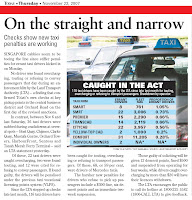
Checks show new taxi penalties are working
Thursday / November 22, 2007
SINGAPORE cabbies seem to be toeing the line since stiffer penalties for errant taxi drivers kicked in on Monday.
No driver was found overcharging, touting or refusing to convey passengers that day during an enforcement blitz by the Land Transport Authority (LTA) - a finding that confirmed Today's own checks at key pickup points in the central business district and Orchard Road on the first day of the revised sanctions.
In contrast, between Nov 6 and last Saturday, 36 taxi drivers were nabbed during crackdowns at several spots - Boat Quay, Chijmes, Clarke Quay, Mustafa Centre, Orchard Towers, HarbourFront, Sentosa and Tanah Merah Ferry Terminal ?said an LTA statement yesterday.
Of these, 22 taxi drivers were caught overcharging, two were found touting, and 12 were cited for refusing to convey passengers. If found guilty, the drivers will be penalised under the previous taxi vocational licensing points system (VLPS).
Since the LTA stepped up checks late last month, 116 taxi drivers have been caught for touting, overcharging or refusing to transport passengers. Of these, 68, or 59 per cent, were drivers of Mercedes taxis.
The harsher new penalties for drivers who refuse to pick up passengers include a $300 fine, six demerit points and an immediate two-week suspension. Those guilty of soliciting will be given 12 demerit points, fined $500 and suspended from operating for four weeks, while drivers caught overcharging by more than $20 will have their licences withdrawn.
The LTA encourages the public to call its hotline at 1800-225 5582 (1800-CALL LTA) to give feedback.
Copyright MediaCorp Press Ltd. All rights reserved.
Thursday 22 November 2007
Wednesday 21 November 2007
Traffic in a mess in peak hour crash, 3 hurt
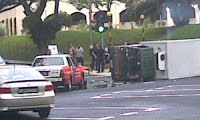
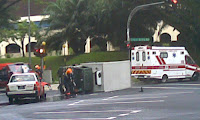
STOMP contacted the Police, which said the accident happened at about 5.30pm at the junction of Lower Delta Road and Bukit Purmei Road, between a van and a taxi.
德士司机的困境
 今日观点 2007-11-21
今日观点 2007-11-21● 林金穆
全国经济高速增长近8%,使到市场欣欣向荣,就业率也达到全民就业,国人都可以期待一个大肥年,生活可以过得好一点。但与此同时,政府也因此而调高税率,各种收费也相应的提高,粮食,面包,面粉,几乎所有的用品食品都开始涨,以致人民已感觉不到经济繁荣所带来的好处。
目前最热门的话题莫过于德士司机的行为以及他们的生活窘境,自从燃油价猛涨、ERP收费调高之后,有谁关心德士司机们的负担呢?当消费税提高后,小贩可以将一碗面调高五角钱,巴士费可以起价,但德士司机们却要承受高昂的柴油费,调高的电子公路收费,又有谁来同情及关心这一群在公路上谋生的司机呢?我们有听过月入过万的小贩、经纪等等,但有谁听过有月入过万的司机。
本人并非德士司机,但我想应该也有人可以代他们说几句公道话。
德士行业本来就不是可以发达的行业,他们每日在路上奔命,到处都需要担心受怕,怕交警抄牌,怕顾客投诉,怕交通阻塞,怕空车要自付ERP等等,可是他们一日收入若有百元已算很好了。
陆路交通管理局取缔、处罚那些违例司机是无可厚非,但诸位负责管理及制定政策的官员是否也应研究一下,怎样才能够解决整个行业所面对的问题,不要以偏盖全,为管制一部份司机的行为而影响整个行业的运作。如果公路电子收费增加的新措施实行之后,德士司机不愿意空车进入市区,或在换班时间内不敢进入德士站载客,或怕被抄牌不敢到市区兜客,到时必定会造成德士供应短缺,搭客没车可搭。甚至有些司机会改行,或兼营副业来增加收入,他们无法以此致富,但服务会更差,而那时问题恐怕照样还会出现。
再次希望陆路交通管理局可以让空车入市区的德士仅付半价入闸,在柴油高涨时降低汽油税来平衡。这样德士和乘客都会受益。同时,我也希望高层的公务员们,应更全面的研究问题之所在,以求改进德士服务以至整个交通体系的运作。如果只调高公路收费、延长收费的时间、以及罚款来解决问题,或把那些触犯条例的司机牌照吊销,恐怕并不能彻底解决问题。
Will the taxi surcharge work?
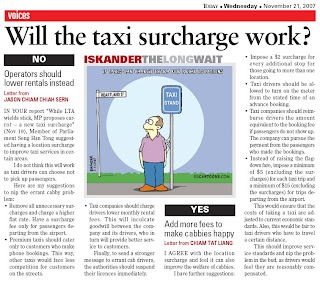
Operators should lower rentals instead
Wednesday / November 21, 2007
Letter from JASON CHIAM CHIAH SERN
In your report "While LTA wields stick, MP proposes carrot ?a new taxi surcharge" (Nov 19), Member of Parliament Seng Han Tong suggested having a location surcharge to improve taxi services in certain areas.
I do not think this will work as taxi drivers can choose not to pick up passengers.
Here are my suggestions to nip the errant cabby problem:
* Remove all unnecessary surcharges and charge a higher flat rate. Have a surcharge fee only for passengers departing from the airport.
* Premium taxis should cater only to customers who make phone bookings. This way, other taxis would face less competition for customers on the streets.
* Taxi companies should charge drivers lower monthly rental fees. This will inculcate goodwill between the company and its drivers, who in turn will provide better service to customers.
Finally, to send a stronger message to errant cab drivers, the authorities should suspend their licences immediately.
Add more fees to make cabbies happy
Letter from CHIAM TAT LIANG
I agree with the location surcharge and feel it can also improve the welfare of cabbies.
I have further suggestions:
* Impose a $2 surcharge for every additional stop for those going to more than one location.
* Taxi drivers should be allowed to turn on the meter from the stated time of an advance booking.
* Taxi companies should reimburse drivers the amount equivalent to the booking fee if passengers do not show up. The company can pursue the payment from the passengers who made the bookings.
* Instead of raising the flag-down fare, impose a minimum of $5 (excluding the surcharges) for each taxi trip and a minimum of $15 (excluding the surcharges) for trips departing from the airport.
This would ensure that the costs of taking a taxi are adjusted to current economic standards. Also, this would be fair to taxi drivers who have to travel a certain distance.
This should improve service standards and nip the problem in the bud, as drivers would feel they are reasonably compensated.
Copyright MediaCorp Press Ltd. All rights reserved.
Tuesday 20 November 2007
解决繁忙时段德士供不应求问题 - 德士公司征收“定点附加费”?
 2007-11-20
2007-11-20● 李静仪
程友明(摄)
德士师傅协会顾问成汉通建议,德士公司征收“定点附加费”(location surcharge),以协助解决繁忙时段某些地方德士供不应求问题。
他建议让德士业者在繁忙时段向乌节路和中央商业区(CBD)德士站,以及酒店大堂外、夜间场所和主要旅游景点向乘客收取定点附加费。
成汉通在最新一期《职总周报》指出:“唯有实施定点附加费才能解决特定地点、特定时段德士供不应求问题,同时继续在组屋区和邻里购物商场维持一般的德士收费。”
成汉通也是职总助理秘书长。德士师傅协会由康福、城市德士、SMRT、胜达(SMART)、Premier和得运(Trans-cab)的德士司机成立。
他说,德士司机面对的最大难题是快速高涨的经营成本。柴油价格和消费税上涨,及租金和使用电召器材的成本,加起来每天增加了25元至27元,司机每月需额外承担780元开销。
陆路交通管理局昨天起实施新措施,加强取缔胡乱开价、非法拉客及拒载的德士司机,违例者除面对更高罚款和记分外,也会立刻被吊销职业执照两星期至四星期,重犯者则被撤销执照。
成汉通认为,德士非法兜客、拒载和索高价的现象,根本原因出在德士服务的定价机制。
他说:“违例司机所以能够得逞,是因为某些地点在某些时段对德士的需求远超出供应。”
这也是导致许多常见投诉的主要原因,包括司机等候电召乘客、拒绝在德士站载客、及中央商业区和酒店等热门地点缺乏德士等。
成汉通说:“我们已不能过度依赖电召方式来提供德士服务,需有一套更有效的定价机制来提高效率。”
目前,平日和星期六傍晚繁忙时段在市区乘搭德士需付1元附加费。为解决机场德士短缺问题,业者在七年前也调高机场德士附加费,收费介于3至5元。从新加坡博览中心搭德士也得付2元附加费。
德士市场龙头老大康福德高昨天受询时,不愿针对是否考虑收取定点附加费给予正面回应。
集团联络总监陈爱玲说:“我们不断探讨各种方法以更好应付乘客需求,设法使繁忙时段的德士供应能进一步满足需求,按定点收费(Location pricing)只是其中的解决办法。”
SMRT德士表示欢迎任何能改善德士服务的新建议,公司正探讨定点附加费建议。发言人说:“我们珍惜德士伙伴,一直推出各种创新措施来协助提升他们的收入和福利,并提供最低租金。”
经营800辆车队的胜达德士董事总经理陶仰潜说:“这是个很好的建议,多少能解决繁忙时段德士供不应求问题,司机也不用躲起来等电召顾客。”
至于是否征收定点附加费,他说:“我们小公司不能做主,其他公司和我们一样,都在等‘老大’行动,这对司机、乘客和德士公司都好。”
经常以德士代步的林美真(42岁,业务经理)说:“现在繁忙时段搭德士已有附加费,在市区搭车也要另外付费,要是电召德士就更贵了,如果再添加定点附加费,我看得改搭公共交通工具了。”
今年首10个月 闯乌节巴士道次数破去年总数
陆交局规定德士司机从明年三月起不能在市区内的路边接载乘客,相信能协助改善车辆违例闯入巴士道的情况。
根据陆交局提供的最新数据,今年首10个月开车闯入乌节路(巴德申路和多美歌之间)全天巴士道的违例次数已突破去年全年总数。
去年在乌节路闯入巴士道的违例次数有2941起,但今年截至10月已有3322起,比去年全年总数多了13%。
此外,自今年4月实行全天巴士道计划的中央商业区五条道路,过去7个月有4318起违例闯入巴士道案例,平均每月600多起,违例司机可被罚款130元,当中不少是德士司机。
新实行“全天制”的巴士道设在余东旋街、禧街(Hill Street)、维多利亚街、勿拉士峇沙路(Bras Basah Road)和索美塞路一带,实施时间为星期一至星期六(不包括公共假日)上午7时30分至晚上8时。
乌节路和中央商业区
下月增设15个德士站
为进一步改善德士服务,同时减少德士闯入巴士道,陆交局下月在乌节路和中央商业区增设15个德士站,使市区的德士站增至95个。
它也将和业者及德士师傅协会商讨,以确定更多可设立德士站的地点,以确保每隔300公尺或步行5分钟就有德士站。它正在确认适合设立15个新德士站的位置,考量点包括增设的德士站对交通流量的影响,及地点本身的局限等。
随着新德士站设立,陆交局规定德士司机只能在德士站和建筑物车道让乘客上下车,包括电召乘客。随意在路边让乘客上下车的德士司机可受罚,有关细节还在拟定中。
除全天巴士道,中央商业区主要道路大多也设有普通巴士道,平日上午和傍晚繁忙时段让巴士优先行驶,只有一些小巷除外。
新条例的实施对德士司机而言,巴士道条例等于“扩大”而涵盖整个市区。
陆交局受询时说,目前还未计划把德士不能在路边接载乘客的条例扩大到市区以外。
In line, but will it last?
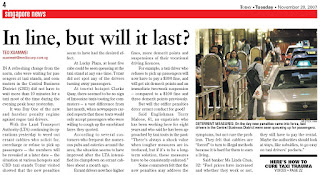
Tuesday / November 20, 2007
In a refreshing change from the norm, cabs were waiting for passengers at taxi stands, and commuters in the Central Business District (CBD) did not have to wait more than 10 minutes for a taxi most of the time during the evening peak hour yesterday.
It was Day One of the new and harsher penalty regime against rogue taxi drivers.
With the Land Transport Authority (LTA) continuing its operations yesterday to weed out errant cabbies who solicit for, overcharge or refuse to pick up passengers - the numbers will be revealed at a later date - the situation at various hotspots and CBD taxi stands Today visited showed that the new penalties seem to have had the desired effect.
At Lucky Plaza, at least five cabs could be seen queueing at the taxi stand at any one time. Today did not spot any of the drivers turning away passengers.
At tourist hotspot Clarke Quay, there seemed to be no sign of limousine taxis touting for commuters - a vast difference from last month, when newspapers carried reports that these touts would only accept passengers who were willing to cough up the exorbitant fares they quoted.
According to several customers who frequent the numerous pubs and eateries around the area, the situation seems to have improved after the LTA intensified its clampdown on errant cabbies about a month ago.
Errant drivers now face higher fines, more demerit points and suspensions of their vocational driving licences.
For example, a taxi driver who refuses to pick up passengers will now have to pay a $300 fine, and will get six demerit points and an immediate two-week suspension - compared to a $100 fine and three demerit points previously.
But will the stiffer penalties deter errant conduct for good?
Said Englishman Terry Malone, 61, an expatriate who has been working here for eight years and who said he has been approached by taxi touts in the past: "There's always a shock value when tougher measures are introduced, but if it's to be a long-term solution, these measures have to be consistently enforced."
Some commuters felt that the new penalties may address the symptoms, but not cure the problem. They felt that cabbies are "forced" to turn to illegal methods because it is hard for them to earn a living.
Said banker Ms Linda Chua, 32: "Fuel prices have increased and whether they work or not, they still have to pay the rental. Maybe the authorities should look at ways, like subsidies, to go easy on taxi drivers' pockets."
Copyright MediaCorp Press Ltd. All rights reserved.
Cabby charges me $6 ERP... at 5 am!
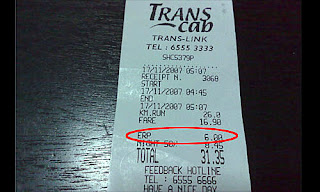
STOMPer Lynn Yong was appalled when she saw that she had been charged an extra $6 for Electronic Road Pricing (ERP) charges by a cabbie at 4.45am!
According to the Land Transport Authority's (LTA) website, the ERP charges are in effect on weekends only between 12pm and 8pm.
Lynn has also written in to taxi company for an explanation.
"Solutions" that come with a price
mollymeek (mollymeek) wrote,@ 2007-11-19 15:48:00
One cannot help but observe that our talented leaders often come up with solutions to our problems--at our expense. When we encounter frustrating traffic conditions, the solution is to implement ERP. And if that doesn't solve the problem, increase the number of ERP gantries together with the charges. Actually that still doesn't solve the problem. The number of vehicles on the roads will still be increasing. Even if you manage to ease massive jams at certain places, maybe youjust spreading the jam over a larger area of the slice of bread without ensuring that the bread is relatively jam-free. (Lame metaphor perhaps, but at least Molly doesn't charge you more for better metaphors.)
And if you have problems getting a cab during peak hours, the solution is to implement a peak-hour surcharge and to constantly stretch the definition "peak hour". Seven-thrity to nine. Seven to ten. Six to twelve. Six in the morning to twelve midnight. Peak hour, peak charges. Wee hours, peak charges too. And so? It's still difficult to get a cab during peak hours. It's even difficult to get through a line that allows you to book a cab (and, yes, that means you have to pay yet another surcharge). But that's a solution. And peak hour and booking surchrages went up last year. Why? I thought they were solutions to a problem and not meant to help taxi companies make more profit? The solution no longer works because people have become inured to paying the surcharges?
Well, never mind. Now Seng Han Thong is proposing yet another surcharge. The location surcharge...
MP Seng Han Thong has suggested an additional sum for busy places like clubs, pubs, hotels, shopping malls and Raffles Place.
The root cause of soliciting, refusing to pick up passengers and overcharging lay in the pricing mechanism, he said, and errant cabbies resorted to such behaviour because demand for taxis exceeded the supply at certain times and places. (CNA)
Additionally, Seng believes that "[t]axi companies need to impose surcharges at taxi stands in the CBD (central business district) and Orchard Road areas during peak hours, and at lobbies of hotels, major tourist attractions and nightspots."
Now, Molly doesn't really see how the excessive demands can result in soliciting and over-charging. If there is a huge demand (in fact, a demand that exceeds the supply), then there is no need for taxi drivers to solicit customers. And if there is an under-supply, taxi comapnies had better ensure that there is an adequate supply of taxis. Molly happens to be of the opinion that you should increase the supply to meet the demand (I don't know how that is going to be done, I have to admit). You don't decrease the demand to meet the supply. (That's what surcharges and other taxi price hike do to solve problems. They suppress the demand temporarily to deal with an undersupply.)
In any case, I can't see how excessive demand or undersupply should affect the behavior of taxi drivers if they simply pick up customers as they come along. Individual taxi drivers are not concerned about that kind of economics. The basic problem is still that of dishonesty or perhaps what drives them to dishonest behavior.
Seng also says:
Only location surcharges can address the problem of balancing the demand and supply of taxi services at specific places and time, while allowing taxis to charge a more affordable rate at other places such as HDB estates and neighbourhood shopping malls.
Oh wow. That's the only solution! Or is that the only solution you can think of? If you have a location surcharge, won't you simply be attracting taxi drivers to go to specific locations? Won't it aggravate the problem of errant taxi-drivers who "choose" passengers and perhaps allow them to do so legitimately to some extent? Won't it make it even more difficult for me to get a taxi when I'm at surcharge-free location? Mind you, at peak hours, it is already difficult for me to get a cab at these other locations. (Then what? I start complainng and you start the Unpopular Location Surcharge in future, just like how you set up more and more ERP gantries?)
If taxi drivers are tempted by the money to solicit customers or to impose dishonest pricing on unsuspecting passengers, an additional surcharge isn't going to stop them - because it's not going to be as lucrative.
"Allowing" taxis to charge a more affordable rate at HDB estates indeed. What do you mean by "allowing"? If I'm a taxi driver, why would I want to be "allowed" to charge a lower fare when I can earn a surcharge elsewhere?
One thing Seng has got right is perhaps the fact that taxi drivers are concerned about their operational costs. "He said taxi drivers' biggest concern was the rapidly rising operating costs, which had increased to some S$780 a month." (CNA)
But imposing a surcharge may not be a solution. If an additional surcharge causes a temporary drop in demand (as the drastic fare hike last year did), then taxi drivers may be further driven to make money through dishonest means.
Why are operational costs of cabbies "rapidly" rising? Are taxi companies squeezing a lot out of them to begin with? (This is not a rhetorical question.) And why should commuters be pay for a non-solution that may create other problems?
Taxi woes? Take our quiz

http://www.straitstimes.com/Free/Story/STIStory_176440.html
Nov 14, 2007
1. How long does it take you to get a cab during evening peak hours?
2. If you feel it's too difficult to get a cab or the wait is too long, what do you think can be done to improve the system?
3. Should the taxi fare structure be revised? If so, what kind of structure would you like to see?
Harsher penalties cut both ways
Nov 14, 2007
By Jessica Lim
AFTER each 10-hour workday, cabby Adi Negara jabs at a button on his fare meter to check his day's takings.
It is usually around $180.
But after deducting his running costs, the 48-year-old is left with $100.
He has to stretch that to feed a wife and four children aged 13 to 22, but he sleeps easy each night knowing it was honestly earned.
Not a cent of that comes from touting, which is why the taxi driver with 11 years' experience welcomes the Land Transport Authority's (LTA) stiffer penalties for errant drivers.
From Monday, cabbies who tout, overcharge or refuse to pick up passengers will be dealt higher fines, more demerit points or suspensions, and may even lose their licences.
But Mr Adi realises the stiffer penalties are a double-edged sword: He worries that he may be suspended for two weeks if commuters complain to the LTA about his refusing to pick them up.
He said: 'Sometimes we cannot stop at some areas. Customers don't understand that and might complain. I am afraid that will happen.'
If a suspension comes to pass, his family would go without money for food for that period of time.
His concerns have deepened with the rising cost of diesel.
Of his gross daily takings of $180, about $30 goes to fuel. This is $5 more than a year ago.
Another $47 pays for the rental of the taxi, and $4 to get the vehicle cleaned.
Although home is a four-room flat in Marsiling, he is struggling with his family's daily expenses.
After paying for utility bills, conservancy charges, food and allowances for the family, $15 is all he has left.
Still, he is determined to steer clear of touting.
Recalling one evening when he picked up four tourists from Orchard Towers, he said he stunned them by turning on his meter.
He said: 'They were so surprised because they were charged $80 from the same place just the night before. They gave me a $7 tip. I felt warm inside.'
He added: 'These touts, they soil the name of us good taxi drivers out there. The harsh penalties are good. Old habits die hard but this will deter some of them.'
Cabbies worried about LTA's stricter measures
Nov 14, 2007
They say they must be extra careful not to run afoul of the law unwittingly
By Lin Xinyi & Jessica Lim
CABBIES say that stiffer penalties the Land Transport Authority will start handing out from next Monday to those who tout, overcharge or refuse to pick up passengers, will just make their lives tougher.
They told The Straits Times they were feeling the squeeze from higher fuel prices and rentals.
Most say they do not engage in touting or overcharging - but the strict new rules mean they have to be extra careful about seeming choosy about who they pick up.
Mr Foo Say Hock, who has been a taxi driver for eight years, explained: 'More penalties mean we have to be observant all the time; and we're sometimes very tired and we may not notice the passenger waiting on the side of the road - and what if he calls my company and complains?'
In an effort to address public outcry over errant cabbies, the Land Transport Authority on Monday said that those who refuse to pick up passengers will now face harsher penalties: a $300 fine, six demerit points and an immediate two-week suspension.
If they solicit - or tout - for passengers, they will now have to pay $500, get 12 demerit points and face an immediate four-week suspension.
And, if taxi drivers are found overcharging by more than $20, their licences can be revoked altogether.
For Mr Sam Lim, 43, any suspension would be disastrous.
The recently widowed man is already driving extra long hours - up to 15 hours a day - to save money for his ill four-year-old son's treatment. The boy has undergone surgery for various medical problems.
Like Mr Lim, several other drivers said they are putting in extra time because of increased motoring costs.
They said fuel is now $5 more each day, compared to a year ago. On average, they earn around $100 daily.
To make up for the added cost, they have to pick up one to two more customers each day.
Mr Andrew Leo, 49, who drives a Mercedes-Benz taxi, said drivers sometimes take risks with the law in order to please demanding customers.
This includes speeding and stopping in no-stopping zones.
'They tell me that even a bus travels faster than my taxi,' he said. 'But if I go too fast, I'll get fined.'
Comfort cab driver Ng Chee Fook, 59, was fined $20 about two months ago when he stopped within 9m of a bus stop. He says he won't do it again.
But for SMRT cabby Pion Eng Hua, 43, it is not so clearcut: 'If I see an auntie carrying shopping bags, how can I not pick her up? But if I do, I might be slapped with a fine. It's so difficult.'
ADDITIONAL REPORTING BY DIANA OTHMAN
linxinyi@sph.com.sg
limjess@sph.com.sg
Taxi surcharges a boon to traffic control but a bane to commuters
Nov 19, 2007
They can lead to scraps between cabbies and passengers
By Maria Almenoar
WHILE travelling from Yio Chu Kang to Tanjong Pagar, a passenger in a taxi chalked up $6 in various surcharges.
When asked to pay for these 'add-ons', the expatriate man refused and stormed out of the taxi despite taxi driver Foo Say Hock's explanations.
'I followed him inside the office building, found the receptionist and asked her to explain it to him. In the end he paid,' said the 60-year-old taxi driver who has been driving for eight years.
'We explain most of the time or we hand them the receipt to clear up doubt. But a simple model might be better for both sides.'
Several taxi drivers The Straits Times spoke to said that the series of surcharges added on to fares can sometimes get them in scraps with their passengers.
Even with taxi drivers claiming they are honest and that these are legitimate charges, passengers still believe they are being taken for a ride.
What leads to these disagreements?
In most cases, it is because the main panel on the meter does not reflect all the surcharges.
During the journey, the panel generally reflects the flag down rate and the charges based on the distance travelled.
When a passenger reaches his destination and asks for the fare, he expects to pay what is on the screen, but instead the taxi driver presses a button on the meter which then gives the full fare.
These surcharges, however, are reflected in the receipts of majority of the taxis.
ComfortDelgro, the biggest taxi company here, for example, said that their receipts show clear breakdowns of the different surcharges which are in place.
Among the surcharges which are in place are the airport surcharge, peak hour surcharge, public holiday surcharge and the call booking charge.
There is also the Electronic Road Pricing charge which passengers must pay, and the staggered midnight charges for taking a taxi in the wee hours of the morning.
While experts agreed that these charges may seem complicated to commuters, most supported the view that these charges served specific purposes.
NUS Professor Lee Der-Hong, however, believes otherwise.
The professor with the faculty of civil engineering pointed out that removing the surcharges and raising the flag down rate would work because for example, there would be difficulty in getting drivers to 'work the graveyard shift'.
Singapore taxi service one of the world's best
I EMPATHISE with Mr Roland Larsson's experience in waiting for a taxi at Gleneagles Hospital ('World's best taxi service - also one of the worst'; ST, July 5).
Thu, Nov 15, 2007
The Straits Times
I EMPATHISE with Mr Roland Larsson's experience in waiting for a taxi at Gleneagles Hospital ('World's best taxi service - also one of the worst'; ST, July 5).
Mr Larsson has harshly given our taxi service a negative rating following his one bad encounter in 50 visits to Singapore in 10 years.
As a regular taxi commuter over the past 25 years, I beg to disagree.
I find the taxi service one of the world's best in terms of cleanliness, safety, efficiency and honesty, not to mention the reasonable fare. There are sufficient taxi operators and fleets for there to be healthy competition.
The information counter of Gleneagles Hospital or the security guard can help one to book a taxi, if one is needed urgently.
There are also other modes of transportation within walking distance of the hospital, like buses and the MRT.
The display of 'Change of shift' signs or placards specifying destination works well. If a commuter waiting in a queue is headed in the same direction as the cabby, he is welcome to hop in.
The number of taxi drivers who talk loudly or use mobile phones (with earpieces, of course) while driving is very small.
Lastly, let us not forget that taxi drivers have a certain amount of prerogative. As it is their own business that they are running, surely they would not slam the door on potential customers and drive around all day without passengers.
If they are running empty, there would be a sign to state the reason, and the public should accept the situation, giving the benefit of the doubt to the small number of drivers who abuse the sign.
After all, at the end of the day, they still have to pay rental for the taxi, regardless of whether they have met their personal fare quota.
I consider myself lucky to have always met with courteous and pleasant drivers. To them I say keep up the good work!
Matthew D. Sukimto
This letter appeared in the ST forum on 12 July 2007
The Singapore Taxi Driver - Fast, Easy And Efficient In Singapore
~ by Ieuan Dolby
Fast, easy and efficient could describe life in Singapore. You don't stroll along the streets in a world of your own with time to spare and you definitely do not walk when a taxi is waiting nearby. Life in Singapore is geared towards the making of money and any spare moment given is put to that task. So if one should need to get to work or get to the office, go shopping or attend the cinema (because the children insist on it) then transport is essential.
Private cars are good and super efficient. The MRT or underground system is also a perfect feat of engineering: fast, clean and cheap for the average punter, but life also seems to include an inordinate number of taxis. They seem to be required and used whether one owns a car or not and even when one is standing right next to the entrance to an MRT station. In an average week one can use a taxi about seven times and that in anybody's books is a lot.
Three companies tend to run the Cab business and all are large and modern, consisting of the latest cars with satellite navigation and instant booking services by a frightening voice box and push button accept system that flashes possible messages at the driver: as if he is not confused enough with the fast flowing and interchanging traffic that is going on around him. Singapore is not a place where once you get into a lane you are okay for half an hour or so. This is a place where once you have settled into your lane ?it is time to change to another, time to enter the tunnel or cross a bridge, go round a roundabout or exit up a ramp. A plate of Spaghetti has nothing on the road system here, but it does flow smoothly, it is extremely well designed and it is safe ?if drivers do not talk too much and check their flashing job screen every other minute!
To catch a cab one can do a variety of things. The usual one of going outside and flagging one down; another way is calling one up on the booking service; and finally, you can join a long queue at a taxi station. The first one is the most amazing and also one of the most frustrating methods of trying to catch one: not that there are none available but the drivers have a strange way of picking up punters. There you are outside your apartment and this blue cab with its light on comes floating towards you. Stopping beside the pavement the driver will lower his window and ask you where you are going.
And the strangest thing is that if you are not going in his direction or to where he wants to go, then he will not pick you up. Amazing but true! Taxi drivers are very obstinate and although Singaporeans like to make money above all else the taxis do not follow that rule. For them food and sleep is more important and so if they are coming towards the end of their shift or feel like dinner, then they will not pick you up unless you want to go where they are going. It is quite possible to stop five or more cabs in a run only for the drivers to shake their heads and zoom off leaving you stranded and confused. A very frustrating time indeed!
The other method of calling a taxi is probably the most efficient and stable one. Simply by calling up the taxi company a taxi can be on its way to you in a matter of minutes. The third method can also be extremely annoying and frustrating as one usually has to stand for about twenty minutes in a long queue whilst suffering from the heat of the day. But by using a taxi station you are assured of being picked up ?by law the driver cannot refuse to take you wherever you want to go if the pick-up point is at a taxi station.
Life though is more interesting than trying to catch a taxi. Life gets more active when one is inside and on the way to their destination. The average driver in Singapore is good. The average taxi driver in Singapore is definitely in need of help. Psychological help in some cases and others just need some basic lessons in driving. The roads in Singapore can be awkward as the forward momentum of the vehicle is constantly disrupted as another stop sign looms up, as another intersection needs to be navigated or another accident causes the whole system to falter. But the taxi drivers even with a smooth road ahead of them constantly apply the breaks and then the gas causing the passengers heads to hit the seat in front of them and then to be thrown backwards against the rear window.
This action on the part of seventy percent of the drivers may not be totally due to bad driving. An unusually high proportion of drivers suffer from sleep deprivation! They will tell you that this is because of the extra long hours that they have to work (to get a tip from you) but many do certainly nod off whilst you are sitting behind them. In one taxi I was sort of trying to read my newspaper with my head waggling backwards and forwards when all of a sudden I noticed that I could read my newspaper. I mean that all of a sudden I was not being thrown around as the driver applied the gas and breaks in rapid succession. This was weird and unusual but I accepted it as another quirk of the industry.
It was when we where zooming along at way past the speed limit, that I looked closer at my driver. He was asleep and soundly so and we where heading straight for the oncoming lane. I acted instinctively and jumped across my prospective killer and adjusted the wheel and thus the cars?direction to suit an accident free journey. Whilst doing that I jabbed my elbow into his shoulder (well, it turned out to be his face) to wake him up. A lucky save and if I had not been aware or had fallen asleep pancake time. I never fall asleep in a taxi after that experience. . Signs of the driver falling asleep are quite noticeable should one look for them. The constant opening and shutting of the window and the drivers?constant changing of the air conditioning settings is a good one. Another is the drivers?desperate scramble for the plastic bottles that he has stashed under his seat. I would question the manufacturers of these drugs because as many a driver takes they never seem to aid him in keeping awake. Oh and the most important thing to watch out for is when your head no longer jerks back and forth ?this means that the driver has fallen asleep and his foot is still.
I normally hate making small talk. I would rather read a newspaper or stare out of the window. But in Singapore Taxis I prefer to keep the driver in conversation as this undoubtedly and without fail will keep him wide-awake. To start off the conversation just say something stupid like, hot day today?as if Singapore is any different from one day to the next. He will invariably turn the conversation around to asking where you are from and then talking about football and Liverpool or he will turn to the state of the economy, no profit in taxi driving anymore, no customers and cars cost more to buy than ever before? This should keep him going for a half an hour or so, more than enough for the trip.
I think the keep awake pills/drugs may have side effects. I have noticed on some occasions that drivers are a bit high spirited. Now whether this an effect of the drugs that kick in a couple of hours later or due to something that is completely removed I know not. I am just trying to make a connection as to when the drivers take their keep awake pills - nothing happens. Anyway, I have often climbed into a taxi and been surprised at the activity of my driver. One memorable trip started off okay until he found out that I was from Scotland. I spent the next twenty minutes of the journey listening to bagpipes and a donkey heehawing whilst being thrown violently against the drivers seat and the rear window in turn. No, it was not music or anything like that, but the driver whilst jumping up and down in his seat, imitated the bagpipes and in between breaths became a horse. He used to say Scotland at frequent intervals as if to reassure me that he knew where I came from.
Weird! I had another bad occurrence in a taxi when he started to get aggressive against a football team and he spent more time trying to clamber over the rear of his seat, to reinforce his opinion than looking where he was going. I got extremely worried about him and decided that I should leave his taxi as quickly as possible. I jumped out at an intersection and decided that I would not pay for such a ride. I could hear him shouting as I ran away down the hard shoulder ?but I don抰 want to pay to be harassed!
Apart from all of the above the typical taxi journey passes without note. Some of the drivers will seriously annoy you or make you feel sick when they open their door and spit a big gob of mucus onto the road side. But this is the way that they do it. I asked one driver not to do that again ?and he didn抰. But generally just try and ignore that. They also tend to get a bit vocal inside of the car if involved in a near miss with another car or have to sit for any length of time due to an accident up ahead. This is due to the fact that if a driver gets out of his car and shouts at another driver then he can quickly and without question be hauled off to jail. The government does not tolerate drivers making a scene in public and so drivers just do not do it, ever. This is all-and-well, unless you happen to be the poor passenger that has to take the brunt of his road rage?whilst pretending that you are not sitting in the back seat of that particular cab. . Sorry, I seem to be putting them down. The taxi system and the drivers are quite excellent and safe in Singapore and no less than any other town or city the world over. When hiring a taxi in Singapore you are ensured of a rapid and free journey to your destination and the cost is not prohibitive, you are safe and looked after at all times. One thing does puzzle me though: why the drivers constantly ask the passengers which way they would like to go. Having just arrived in Singapore I catch a taxi at the taxi station just outside the airport. I give him the name of the hotel and off he goes. After five-minutes this driver will invariably turn around and ask me whether I would like to go by the PIE or by the East Coast Road. Stupid question really as the average person arriving at Singapore Airport and especially one who is going to a hotel would not have a clue about the transport system in Singapore.
I used to think that the drivers where testing their passengers as to their knowledge of Singapore and that if they showed ignorance then they would be carted off on a tour of the city without knowing the difference. But this has not been the case as I have often put it to the test. The driver has asked me and I have given him no inkling as to my knowledge of the city ?and he has taken me the quickest route! Such is life!
Listen everybody: the Taxi Drivers in Singapore are of excellent quality and any prospective passenger is assured of an easy, safe and smooth-drive to their destination ?don抰 listen to me.
Just keep your eyes open and the drivers as well if you can!
To contact Ieuan Click Here
Ieuan is Author and Webmaster of http://www.seadolby.com
Here's how to ease taxi trauma - Scrap taxi-booking system, up fares
Voices // Tuesday, November 20, 2007
Here's how to ease taxi trauma
Scrap taxi-booking system, up fares
Letter from ERIC TEO CHIN HONG
I refer to the report "While LTA wields stick, MP proposes carrot" (Nov 19). Member of Parliament Seng Han Thong has proposed a location surcharge to increase the supply of taxis at "busy places" such as pubs, hotels and shopping malls.
This proposal may make the problem worse as taxi drivers may decide to stay away from the designated areas. This would force commuters to call for a taxi instead, and allow drivers to earn the booking fee in addition to the location surcharge.
I feel the root of the problem lies in the taxi-booking system itself.
Many taxi drivers find the booking fees so attractive that they would rather drive around while waiting for a booking, instead of picking up passengers.
Try flagging a taxi between 6pm and 10pm on a weekday at Raffles Place and the magnitude of the problem becomes clear.
A simpler way to address the problem would be to scrap the booking system. Instead, I suggest charging a premium in addition to the general taxi fares, similar to the current midnight charge.
Together with the increase in peak-hour fares, the scrapping of the taxi-booking system would see taxis in areas where demand is the greatest.
I hope the authorities consider eliminating this as it is hurting Singapore's bid to provide a world-class public transport system.
What about the 'non-busy' areas?
Letter from HALIM WAHAB
I am surprised by MP Seng Han Thong's proposal to introduce a location surcharge.
If a surcharge is introduced for "busy areas", it may make it very difficult for commuters to find taxis in other "non-busy" locations, such as in the heartlands.
Changi Airport is a good example. There is usually a long queue of taxis waiting for passengers there.
If these taxis were plying the streets, we would not face such a taxi shortage.
Let the cabbies take home more money
Letter from ARTHUR TAN
I refer to David Lim's letter "Usage charges are better" (Nov 14). I agree that such surcharges only add to our taxi woes.
The authorities should simply increase general taxi fares and eliminate surcharges so that taxi drivers can take home more money.
Perhaps the Electronic Road Pricing for taxis could be reviewed as well.
Monday 19 November 2007
Flooding in Jurong East
Passenger hurt in Choa Chu Kang accident
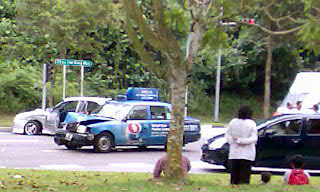
http://singaporeseen.stomp.com.sg/viewPost5199.aspx
Posted on 02 Sep, 2007
Housewife Gill, 37, said a taxi and a car were involved in an accident in Choa Chu Kang North 5 at about 3pm today (2 Sept).She lives in the area and said this spot is prone to accidents.
"There is a U turn here and oncoming vehicles seem to collide," she told STOMP.Another STOMPer sent this photo in an MMS.
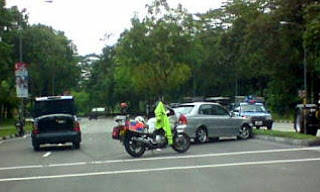
STOMP contacted the Police and it replied this afternoon:
"We received a call today at about 2.30pm about an accident between a taxi and a car at the junction of Choa Chu Kang Way and Choa Chu Kang North Avenue 5.
"An Indian taxi passenger was conveyed conscious to NUH with facial injuries.
"Police investigations are ongoing."
Passengers get off without paying cabbie
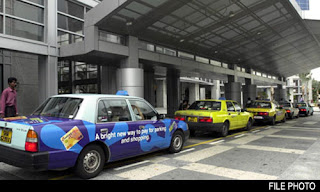
http://singaporeseen.stomp.com.sg/viewPost6692.aspx
Posted on 19 Nov, 2007
First, they did not alight at their initial destination. Next, they asked the cabbie to continue the journey, not specifying a destination. Finally, they refused to pay for the taxi fare.
Three passengers made this one hell ride for a cabbie, who had picked them up at Emerald Hill on 18 November at about 12.30am, and was asked to bring them to Clarke Quay.
STOMPer Ng Leong Chye wrote in to STOMP on behalf of his uncle, the unlucky cabbie. This is his uncle's account:
"At about 12.40am, I stopped at the Clarke Quay taxi stand, informing them that the fare was $5.10. The side passenger door was open for them to get down and suddenly, they told me to continue the journey.
"Without any specified destination, I informed them that I could not do so as they did not give me a clear destination. Then they started to scold me with Hokkien vulgarities.
"They finally got off and slammed the door of my taxi,without paying the taxi fare due!"
Leong Chye's uncle later filed a police report.
His afterthoughts about the incident?
"I feel that those three passengers are a disgrace to Singapore. We as taxi drivers are only doing our job and I feel we should be given some respect from customers, not enduring bullying tactics from them.
"Nowadays, there are many negative news report on taxi drivers who choose passengers and tout. But some passengers are equally guilty of poor ethics and I strongly believe that this kind of incident not only happens to me, but also to other taxi drivers.
"I hope that through this report, other taxi drivers will also stand out and share their stories.
"If more of passengers are like the three passengers I had encountered, who would still want to be taxi drivers? What would the society of Singapore will become?"
离奇事故:嫌犯清晨劫德士后撞车死

日期 : 07 August 2007 2102 hrs
网址 : http://www.xin.sg/article.php?article=7931
新传媒新闻报道,直落布兰雅发生离奇交通事故案,一名男子在清晨时分劫走一辆德士,半个小时后,他竟然开车撞上了路边围墙,当场丧命。
猛撞围墙的德士几乎半截车不见了,这辆德士本来的司机,清晨五点时,把德士停放在直落布兰雅弯的路旁,然后下车买报纸。不料,一名中年的华族男子突然冲上德士,亮出一把银色的物件,还强行把德士开走。德士司机马上向另一名同行求助,并一路追踪劫走德士的男子。
可是当他们寻获德士时,德士已撞上直落布兰雅路和亨德申路交界处的一个路墙,车身毁不成形。他们也发现劫走德士的男子倒在驾驶座上,猛烈的撞击力导致他身受重伤,医护人员在5点35分宣告他不治身亡。
警方也在车祸现场、寻获一包橙色的塑料子弹和一把损坏的银色玩具手枪。警方仍在调查这起案件。
车祸:两车相撞 罗厘翻覆 德士车头受损
网址 : http://www.xin.sg/article.php?article=6952
新传媒新闻报道,汤申路上段和西海岸一带中午之前,相继发生严重交通意外。一辆罗厘被撞翻,直立在汤申路上段的路中央,另有一辆货车在西海岸高速公路上起火燃烧,毁不成形。
上午10点15分左右,在汤申路上段和玛丽蒙路的交界处,一辆罗厘同德士相撞,德士的右前方被撞烂,而罗厘则被撞翻,整辆车侧翻过来、直立在路中央,挡风镜破裂,所幸罗厘司机没有受伤。女德士司机则因为惊吓过度送往陈笃生医院接受观察。
大约两个小时后,一辆行驶在西海岸高速公路的货车,起火燃烧,几乎成了焦黑的废铁,所幸没有人受伤。
While LTA wields stick, MP proposes carrot – a new taxi surcharge
Hot News // Monday, November 19, 2007
Hedirman Supian
hedirman@mediacorp.com.sg
EVEN as the Land Transport Authority brings out the big stick in its bid to rein in errant cabbies starting today, a Member of Parliament has proposed a peak-hour carrot — a "location surcharge" — to improve taxi services in areas with greater demand.
MP Seng Han Thong has suggested an additional sum for busy places like clubs, pubs, hotels, shopping malls and Raffles Place.
The root cause of soliciting, refusing to pick up passengers and overcharging lay in the pricing mechanism, he said, and errant cabbies resorted to such behaviour because demand for taxis exceeded the supply at certain times and places.
The MP, who is adviser to the six-affiliate Taxi Operators' Association, wrote in the latest edition of NTUC This Week: "Taxi companies need to impose surcharges at taxi stands in the CBD (central business district) and Orchard Road areas during peak hours, and at lobbies of hotels, major tourist attractions and nightspots.
He said: "Only location surcharges can address the problem of balancing the demand and supply of taxi services at specific places and time, while allowing taxis to charge a more affordable rate at other places such as HDB estates and neighbourhood shopping malls."
Singapore's approximately 45,000 taxi drivers have been getting a lot of bad press recently for soliciting, overcharging, meter-less rides, accepting advance bookings but not turning up, and refusing to pick passengers at taxi stands.
Effective today, the LTA will enforce harsher penalties on drivers for refusing to pick up passengers — a $300 fine, six demerit points and an immediate two-week suspension.
Those guilty of touting will be docked 12 demerit points, fined $500 and suspended for four weeks, while drivers caught overcharging by more than $20 will have their licences withdrawn.
A Today reader complained recently that a taxi driver had charged him and his friend $50 for a ride to Changi Airport from Boat Quay, while others said they were stood up by cabbies despite confirmed advance bookings.
But Mr Seng noted that the "silent majority" of taxi drivers were hardworking, making an honest living.
"We know that a very small group of errant taxi drives have given the Singapore taxi service a bad name whereas the silent majority is not as vocal as others in explaining the problems they have to face everyday," he wrote.
He said taxi drivers' biggest concern was the rapidly rising operating costs, which had increased to some $780 a month.
"The pressure on them is immense because they have to work hard to earn the extras in order to settle these increases in operating costs," he said.
The parliamentarian's proposal did not sit too well with bunker trader Lynn Chong, who said: "No, there's enough surcharge. There's already a peak-hour charge. It already costs up to $7 upfront if you take a cab in the CBD or town area during the peak hour." It will cost even more if one makes a call booking.
Ms Carol Loo, a financial adviser who spends between $600 and $800 a month on cabs, agreed, laying the blame on errant drivers who just cruise around waiting for call bookings. A price change will not make a dramatic effect.
She suggested that the taxi companies re-look their business models: "Their practices are lousy in the first place. A price fix won't be fair to people, they should be paying more for better service or quality."
But marketing undergraduate Nur Iskandar Malik welcomed the proposed increase during peak hours: "I wouldn't mind paying."
It would be better than having to wait in vain for a cab. Like many other long-suffering commuters, he will find out tonight if the LTA stick will see the return of the "disappearing" taxis during peak hours.
